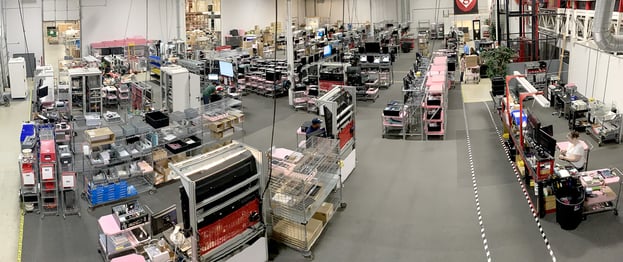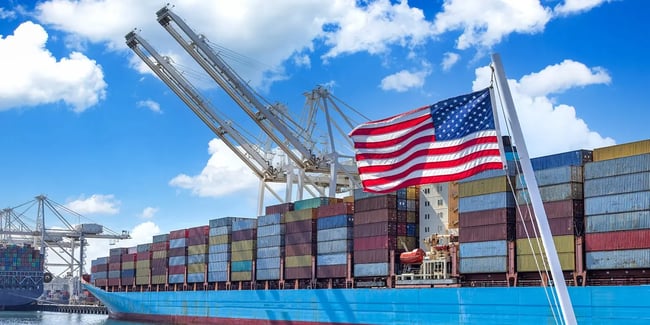OEM Reshoring Guide: Bringing Manufacturing Back to the USA

Written by Hans Dittmar
For decades, outsourcing production overseas seemed like the obvious choice for many OEMs because of benefits like lower labor costs and established manufacturing infrastructure. But the COVID-19 pandemic, tariffs, geopolitical conflicts, and rising shipping costs in recent years have exposed the drawbacks of relying too heavily on distant suppliers.
Reshoring-bringing manufacturing back to the country of consumption-has reemerged as a compelling strategy. While it is not a universal solution, reshoring offers substantial advantages for OEMs seeking resilience, agility, and stronger long-term competitiveness. Below, we explore five key reasons OEMs are bringing manufacturing back to the U.S. and the benefits of reshoring, followed by practical considerations for companies evaluating the move.
Table of Contents
- 5 Key Reasons OEMs Are Reshoring Manufacturing to the USA
5 Key Reasons OEMs Are Reshoring Manufacturing to the USA
Here are five major reasons OEMs are starting to reshore manufacturing back to the U.S.1. Supply Chain Resilience & Risk Mitigation
One of the clearest takeaways from the COVID-19 pandemic was the vulnerability of global supply chains. Shutdowns, transportation bottlenecks, and sudden regulatory shifts left many OEMs scrambling to secure parts and maintain production.
Offshoring strategies that rely on a single country or region amplify these risks. Natural disasters, political unrest, or new tariffs can disrupt supply for months at a time. By reshoring, OEMs reduce exposure to these global events.
U.S.-based manufacturing shortens the distance between suppliers, manufacturers, and customers. That means fewer weeks of inventory sitting in transit, greater agility when market conditions change, and less risk of prolonged production halts.
Another benefit is ease of communication. While it is feasible to work with a supplier that is in a time zone different from your own, scheduling can be made more convenient by engaging a supplier that is an hour or two different in lieu of one that is 10 hours shifted. This also accommodates face-to-face meetings much more readily. It’s nice to know that if an issue is identified, you can pick up the phone and call - and move quickly to a solution.
2. Total Cost of Ownership Advantage Is Shifting
For years, low-cost country sourcing gave U.S. OEMs a cost advantage. But today, the economics look very different. Wages in many overseas markets have risen steadily. Shipping and fuel costs have increased, and tariffs have become more common. These shifts have narrowed the cost difference between offshore and domestic production.
The hidden costs of offshore manufacturing are just as important to consider. Costs from quality issues, rework, miscommunication, and time zone delays all add up.
When OEMs run a Total Cost of Ownership (TCO) analysis that includes logistics, inventory risk, compliance, and quality, they often find U.S. manufacturing is more competitive than expected. Manufacturing close to the customer helps avoid tariffs, simplifies logistics, and improves collaboration between engineering and production teams.
3. Quality Control & IP Protection
For OEMs that make high-complexity assemblies, medical devices, or other mission-critical products, consistent quality and intellectual property (IP) protection are non-negotiable. Managing these priorities from thousands of miles away introduces significant challenges.
Domestic manufacturing enables real-time quality monitoring and compliance with stringent regulatory standards. Oversight is simpler when engineering and production teams operate within the same region.
With IP protection, the U.S. offers stronger safeguards than many low-cost countries, where risks of counterfeiting or IP theft can be significant. Manufacturing in China, for example, can be risky if the manufacturer is not a wholly owned facility of a US-based company.
It can also make a product transfer easier if the supplier is CCC certified. Working with a US-based CCC-certified contract manufacturer or reshoring to the U.S. minimizes these risks and helps OEMs maintain tighter control over their intellectual property.
4. Speed, Flexibility & Customer Responsiveness
Today, customers expect short lead times, accurate delivery, and the ability to adapt quickly to changes in demand. Reshoring enhances an OEM's ability to deliver on all three fronts.
With domestic production, lead times are shorter, and supply is less vulnerable to port delays or global shipping disruptions. This speed advantage allows OEMs to respond more quickly to market trends or customer needs.
Reshoring also supports smaller, more frequent production runs and rapid customization. This flexibility is especially valuable for industries with volatile demand or specialized customer requirements. Faster response times and better service can directly translate into stronger customer satisfaction and loyalty. Further, this can help reduce inventory costs, since companies can order smaller batches more frequently with the decreased transit time.
5. Strategic & Political Advantages
Government incentives, like proposed reshoring funds or tax benefits, can make U.S. production more attractive. Consumers and businesses alike increasingly prefer products made in the USA, which can serve as a brand differentiator.
Reshoring also reduces exposure to shifting trade policies and international tariffs, offering greater stability. On top of that, supporting domestic jobs strengthens OEMs' reputations while tapping into a skilled U.S. labor pool.
Understanding these broader strategic drivers is essential to making the right decision. For more on the market forces and trends influencing reshoring decisions, see our post Reshoring Realities: Navigating Opportunities and Challenges.
Challenges & Considerations Before Reshoring
While there are many benefits of manufacturing in the U.S., reshoring does pose some challenges. Some types of low-value or high-volume production may still be more cost-effective or efficient to produce overseas due to cost or capacity constraints.
OEMs considering reshoring should evaluate several key factors:
- Workforce availability.
Does the region have skilled labor to support production?
- Supplier readiness.
Are local suppliers able to meet your quality, cost, and delivery requirements?
- Regulatory compliance.
What certifications, safety standards, and local regulations apply?
- Capital investment.
What equipment, facilities, or infrastructure upgrades will be required?

How GMI Solutions Helps OEMs Reshore Seamlessly
GMI Solutions specializes in guiding OEMs through the reshoring process. Our dual manufacturing capabilities in the U.S. and China mean we are positioned to help companies transition without disruption. Our expertise includes navigating certifications like China's CCC, ensuring quality oversight, and managing complex transfers of production.
We bring decades of experience in high-complexity electro-mechanical assemblies, design for manufacturability (DfM), and turnkey solutions. Whether you’re reshoring a single product line or an entire portfolio, GMI provides the resources, engineering support, and supply chain expertise to help you succeed.
Ready to Explore Reshoring? Contact Us Today
Reshoring is a major decision that must take many factors into account, including costs, resilience, and long-term strategy. With global uncertainty continuing to reshape supply chains, now is the time to evaluate whether bringing manufacturing back to the U.S. makes sense for your business.
If you're ready to explore reshoring, GMI Solutions can help. Our team of experts is here to assess your options, guide the transition, and provide a seamless process from start to finish.




